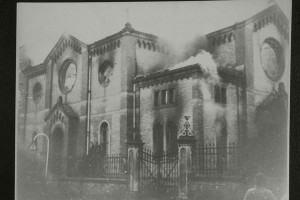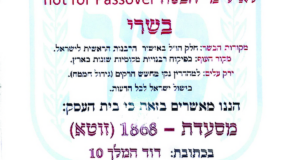“Torah is the best guardian,” intoned a young man, citing a martyred sage.
 Jerusalem, March 25 – Students disregarding official warnings to avoid leaving the home if at all possible and not to congregate or spend time in proximity with others told reporters today they do not need to heed those directives because they enjoy the divine protection that accrues to those who devote themselves to the study of sacred texts, just as the devoted students of those texts only suffered mass murder and dehumanization under the Nazis and their local collaborators.
Jerusalem, March 25 – Students disregarding official warnings to avoid leaving the home if at all possible and not to congregate or spend time in proximity with others told reporters today they do not need to heed those directives because they enjoy the divine protection that accrues to those who devote themselves to the study of sacred texts, just as the devoted students of those texts only suffered mass murder and dehumanization under the Nazis and their local collaborators.
Attendees of yeshivas in this holy city dismissed the concerns raised by journalists that the students’ irresponsible behavior puts themselves and others at risk of contracting a deadly disease, with the most vulnerable among them the elderly, to whom they take pride in showing honor otherwise. People who study Torah have special divine protection from misfortune, they argued, citing famous Talmudic teachings that they understand as categorical, as well as the more recent precedent of the great yeshivas of Poland, Lithuania, Russia, Hungary, Romania, and elsewhere getting all but wiped out in the Holocaust.
“Torah is the best guardian,” intoned a young man. “We who dedicate ourselves to the words of the great sages will not come to harm,” he added, adducing the examples through the ages of the sainted Rabbi Akiva, Rabbi Elazar ben Shammua, Rabbi Eliyahu of York, Rabbi Elchanan Wasserman, and countless other Torah giants who were put to death in cruel or gruesome fashion.
“Please do not disturb our learning, which protects everyone,” added his partner, as the two crowded into a packed study hall with dozens of others, several of whom have close relatives hospitalized with the illness.
Other religious institutions have held regular services without enforcing distancing of at least two meters between attendees. “We’re engaged in a mitzvah,” the fulfillment of a divine commandment, “and that guarantees us protection,” explained a man emerging from a synagogue in the Katamon neighborhood, just as it protected the communities all over Europe from having their synagogues defaced and torched as people prayed inside.
Experts noted that the assumption that engagement in Torah study and other spiritual pursuits will spare the practitioner and the practitioner’s family and community itself carries the assumption that in other generations or instances in which harm did come to Torah-observant Jews, they did not quite meet the threshold of dedication and piety necessary to trigger the protective properties of Torah study and mitzvah performance, unlike the current one, of course.
Please support our work through Patreon.



